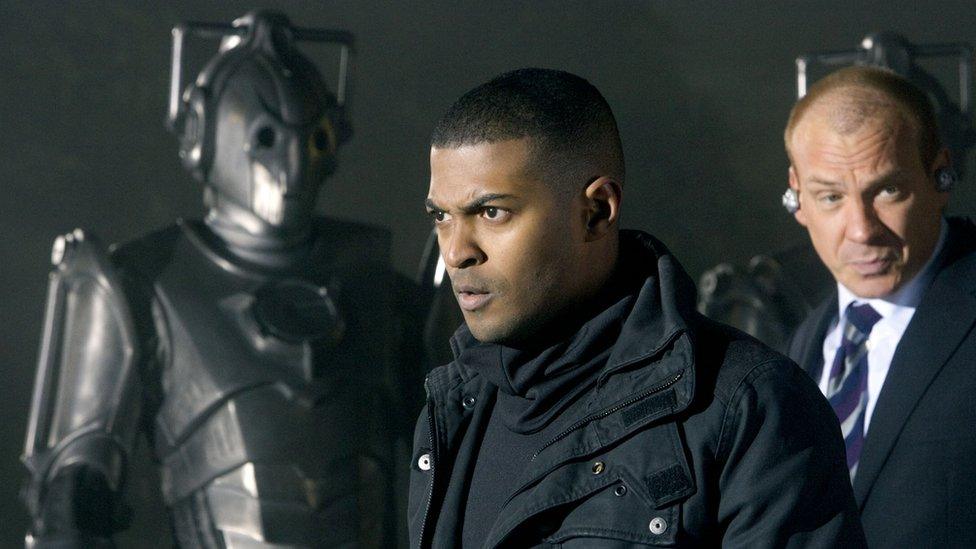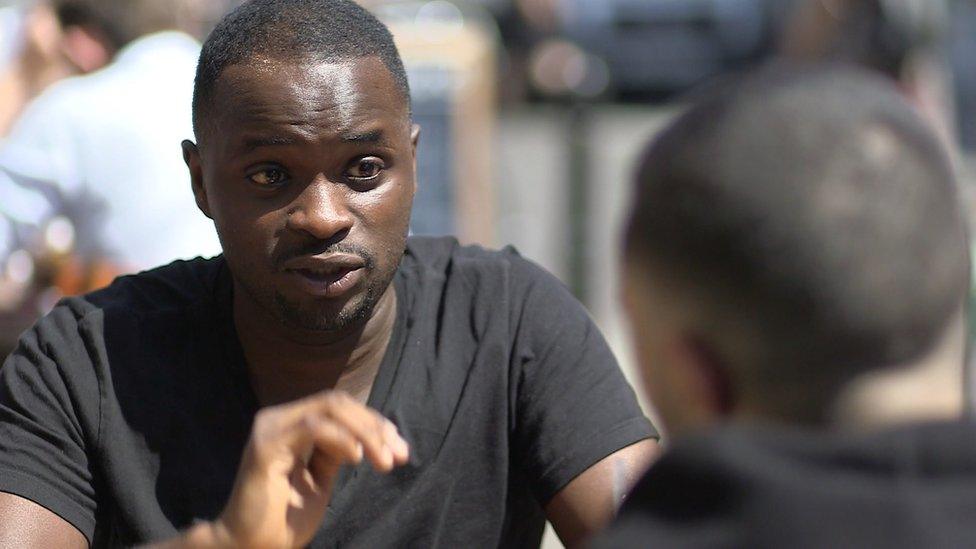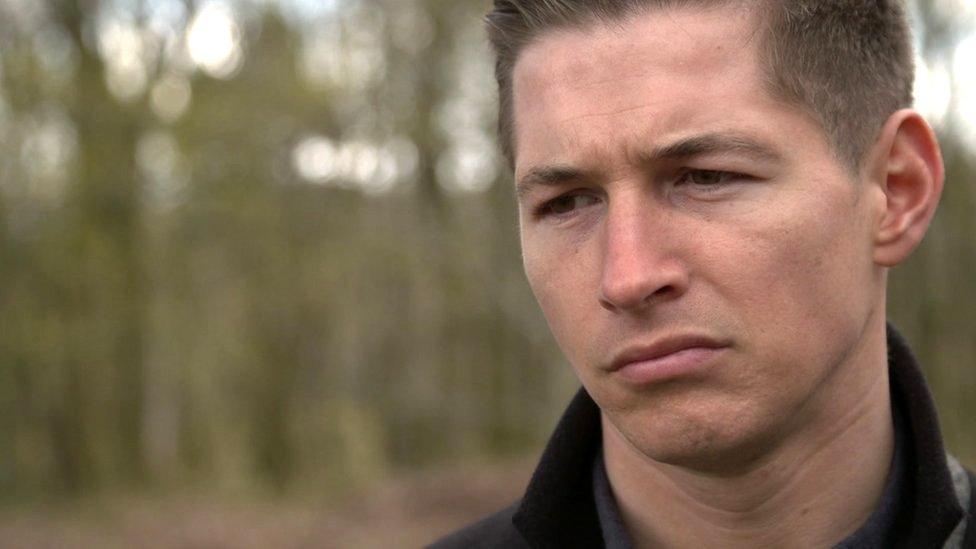Bipolar: Adam Deacon and Stephen Fry on 'lifelong struggle’
- Published
Fry: People who love me best read my mood before I do
Bafta-award-winning actor Adam Deacon says he once worried that bipolar disorder, a condition that causes extreme mood swings, would end his career. But now he says he is learning how to live with the condition, armed with advice from actor and fellow sufferer Stephen Fry.
"Bipolar life has two speeds," says Deacon.
"One minute it's all too fast. The next, everything becomes so slow that I can't cope."
Roughly one in 100 people in the UK is diagnosed with bipolar disorder during their lives. The condition was previously known as manic depression and sufferers experience exhilarating highs and depressing, sometimes suicidal, lows.
After starring in the 2006 teenage drama film Kidulthood and writing and acting in his own movie, Anuvahood, in 2011, Deacon's career was going brilliantly - culminating in a Bafta award in 2012.
But his behaviour became more erratic and, from 2014, his life started to unravel. He ended up in court twice - for sending abusive tweets to a former colleague, Doctor Who actor Noel Clarke, and threatening a stranger with a long-bladed knife.
He was sectioned under the Mental Health Act in January 2015 and diagnosed with bipolar disorder the next year.

Actor Noel Clarke received a "barrage" of abusive messages from Deacon, a court heard in 2015
"I ended up making it more public because of Twitter," Deacon says in a film for the BBC's Victoria Derbyshire programme, "and I was writing all this crazy stuff without even realising it.
"Sometimes I wish that someone would have taken my phone away and just made me come off social media."
Despite his early career success, Deacon began to wonder whether he would work again following the diagnosis.
It's a subject he brings up in a discussion with the actor, writer and comedian Stephen Fry, who also has bipolar disorder.

Find out more
The Victoria Derbyshire programme is broadcast on weekdays between 09:00 and 11:00 on BBC Two and the BBC News channel.

"Will [potential employers] just think you're mad, that you're not reliable anymore?" Deacon asks.
"What do you do to let people know that you're cool, that you're fine?"
Fry recommends being "upfront" with potential employers about the condition, but also says, starkly: "The struggle will always go on until your life is over."
"You have the advantage that you're in a soft, cushioning kind of industry, where people know and understand you," he tells Deacon.
"The disadvantage is that you're acting it out in public."
Fry has tried to kill himself several times - first as a teenager in the 1970s and again in the mid-1990s, when he walked out of a West End play in which he was starring.
He was diagnosed with bipolar disorder, which he later revealed in a BBC documentary.
"That's when I thought that everything would be OK," says Fry, "because I'd named the beast, I'd faced it. I was kidding myself."
He tried to kill himself again in 2012. Fry remembers thinking after one suicide attempt: "I am a lunatic. I'm not a sane person."

Bipolar disorder
There are different types of bipolar. Those with type I experience periods of manic highs and depressive lows. Those with type II experience severe depression and mild manic episodes - known as hypomania - that last for a shorter period of time. Those with cyclothymia experience less severe mood swings, but they can last longer.
During a manic episode, those with bipolar disorder can feel euphoric and have lots of energy, ambitious plans and ideas. But they can become aggressive, and experience symptoms of psychosis.
The exact cause of bipolar disorder is unknown. Some experts believe it can be developed as a result of severe emotional distress as a child, as well as genetic and chemical factors.
One in every 100 UK adults will be diagnosed with the condition at some point in their life.
Sources: NHS, Royal College of Psychiatrists and Mind

There is speculation that many leading creative and showbusiness figures suffered from bipolar disorder, among them Vincent van Gogh, writers Edgar Allan Poe and Virginia Woolf, and comedian Tony Hancock.
"Look at the remarkable people in our history who have had this condition," says Fry.
"Look at what they've achieved and be confident that it is not a death sentence."
Psychologist and performance coach Carol Chapman thinks people in the creative industries are "more susceptible" to bipolar disorder.
"Performing artists are huge risk-takers," she says.
"They're very open. They're very creative. They go to the edge of things and go all the way. If you're doing that kind of thing for a living, then you're putting yourself at risk."
But, as Stephen Fry says, bipolar "isn't some kind of blessing that artistic people get that makes them more creative, this is something that is suffered by people who work in shops and offices and call centres and welding shops".

Kidulthood star Femi Oyeniran says there were days on set where it was like "managing a kid"
Deacon meets his friend and fellow Kidulthood star Femi Oyeniran to find out how his behaviour appeared before his diagnosis.
"I think it just got too much for you," says Oyeniran, "and there were days when you were just sitting on the floor in the middle of an estate while we were filming, going crazy.
"It was like managing a kid and creating an environment for you where you could truly be your best."
Adam Deacon: Being sectioned was good for me
In 2012, Deacon beat now-established film stars Chris O'Dowd, Eddie Redmayne and Tom Hiddleston to take Bafta's Rising Star Award.
But this didn't result in as much acting work as he had expected. He also became estranged from his family and was using large amounts of skunk cannabis.
"I think it was a mix of everything," he says. "And then I just wanted to be left alone. It got too much and then I just remember blocking everyone. I couldn't talk to anyone.
"I was just in my own world. I was ill. It was like having a breakdown in public."
Some experts believe bipolar disorder can be developed as a result of severe emotional distress as a child, and Deacon thinks growing up in a troubled household in Hackney, east London, is partly responsible for his condition.
"All my life I've just been left to my own devices," he says.
"It feels like I don't have a family. Even when I was working, something wasn't right."
- Published10 May 2016

- Published20 November 2015
